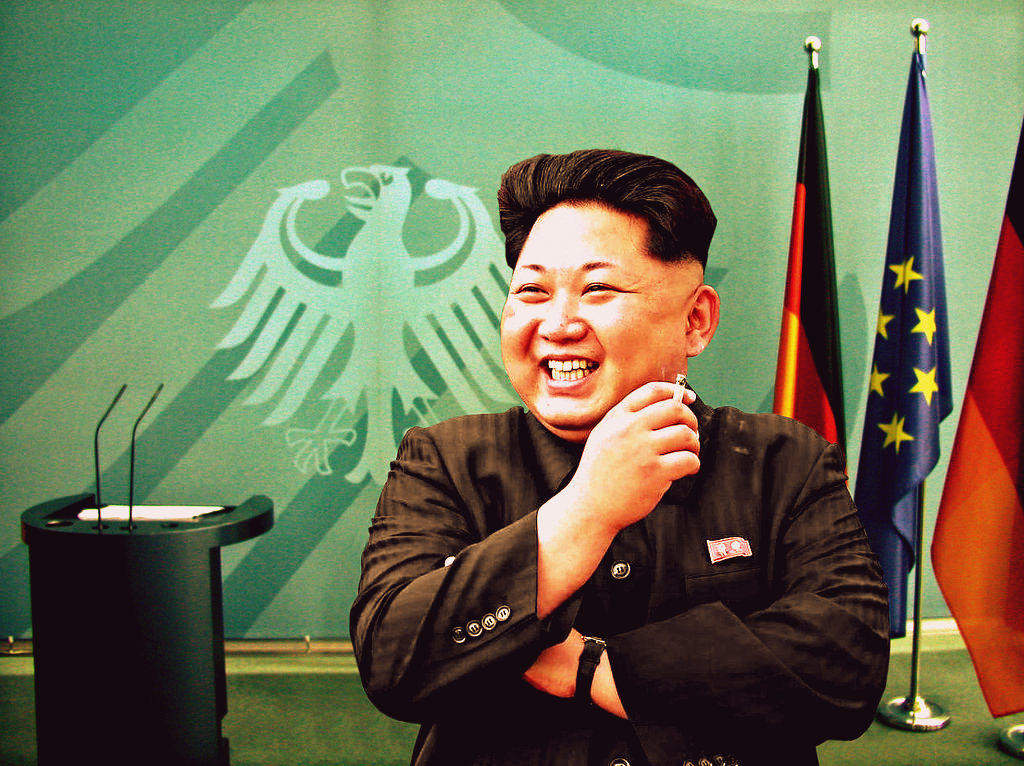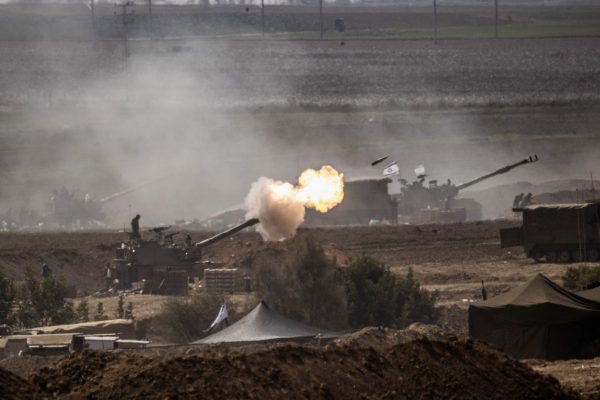On Friday morning President Donald Trump sent a Tweet that, for the second time, escalated tensions with North Korea. After North Korea’s leader Kim Jong-un threatened a demonstration of his missile power against the U.S. Pacific territory of Guam, launching missiles that would be programmed to land only 30 to 40 miles from American military bases there, Trump tweeted that the U.S. military stands ready to fight—“locked and loaded”—and that “hopefully Kim Jong Un will find another path!”
In his skewed way, Kim Jong-un wants self-determination for North Korea. This is not possible without a major change in the relationship with South Korea.
But what does Kim Jong-un want? His immediate aim is the preservation of his regime, avoiding an Iraq-style U.S. intervention. He believes that having nukes and missiles with a proven capacity of inflicting damage on the United States is the only guarantee against invasion and forced regime change. But the extreme nationalism of North Korea also gives some clues to long-term aims. In his skewed way, Kim wants self-determination for the North and he wants to make the country a major player in regional affairs, able to stand up to Japan and to China.
But even accounting for the skewed logic of Pyongyang, it is hard to see how such an aim can be achieved in any form without major change in the relationship between the two Korean states. In this may lie our best chance for peace both short-term and long-term.
• • •
It is impossible to understand the threats and counter-threats in the relationship between North Korea and the United States without first grasping the history that informs them. Even if Kim seems preoccupied with simply preserving and showing off his power, there is no doubt that he and the leadership group around him regard themselves as the last, best hope of Korean nationalism, even if they have to confront the whole world to carry out their program of self-aggrandizement.
Korean nationalism was born of the misery the country saw in the early twentieth century, first as a colony of Japan and then as a participant in World War II and the Korean War. A unified nation for more than a thousand years, it was arbitrarily halved into Soviet and American zones of occupation after being freed from Japanese rule in 1945. Ever since, the Democratic People’s Republic of Korea (DPRK), as North Korea is officially called, has regarded the United States as its main enemy. The driving force of its policies is the compulsion to reunify Korea under its leadership.
In 1950 the Korean War began because Kim’s grandfather, Kim Il-sung, attacked the South in order to unify the country by force. Though he was supported by China and the Soviet Union, Kim still failed in his aim because of U.S. intervention under the auspices of the United Nations. It is commonly referred to as “the forgotten war” in America, but the war left Korea devastated. The ceasefire implemented a demilitarized border between the North and the South. Cities on both sides were in ruins, with millions of people left refugees in their own country. The GDP per capita of both the North and the South was below $150 per year, less than for most African countries at the time. Most Koreans therefore felt that their country had had quite a terrible encounter with the modern world. They were convinced that the only way in which things could be abated was through a strong sense of national values and worth.
Korean nationalism was born of the misery the country saw in the early twentieth century, first as a colony of Japan and then as a participant in World War II and the Korean War.
The regime of Kim Jong-un rationalizes its external bellicosity and its internal repression by claiming that both are necessary if the North is to survive. North Koreans are told that without the Kim regime, foreign countries will forever dominate Korea. The sacrifices that North Koreans regularly endure—hunger, regimentation, the constant search for subversives—are therefore positioned as unavoidable if the country is to avoid falling to its enemies. Relatively isolated and constantly barraged by the regime’s message, most North Koreans (though by no means all) believe in Kim’s skewed version of reality. The Americans, claims a recent propaganda message from North Korea’s General Staff, “set the northern half of the Republic, in which the sovereignty of the DPRK is exercised, as the theater of the ‘preventive war’ and claim it can be an ‘ideal option’ unharmful to them, as only Koreans will die there.”
As the rhetorical conflict with the United States has intensified, North Korea has also lashed out against its former allies, China and Russia. When China voted with the United States at the UN to impose sanctions on Kim’s regime after its latest nuclear tests, Pyongyang ridiculed it, saying that “this country, styling itself a big power, is dancing to the tune of the U.S., while defending its mean behavior . . . ; it may be applauded by the enemies of the DPRK, but it should get itself ready to face the catastrophic consequences in the relations with the DPRK.” Russia, said North Korea, has “boarded the ship operated by the U.S. all of a sudden to be ‘complimented’ by Trump. . . . It will be clear to Russia itself whether it is really the blind or is feigning the blind.”
North Korea’s rhetorical march toward war puts enormous pressure on China, the only major country that has provided significant support for North Korea up to now. Under its communist leaders, China sacrificed nearly half a million men to preserve the DPRK during the Korean War. And, in spite of repeated criticisms from North Korea’s leaders for not doing more, China has kept the DPRK afloat since the end of the Cold War through trade and subsidies. China’s president Xi Jinping would have ideally preferred the status quo on the Korean peninsula: a weak North Korea dependent on China, avoiding any change that could lead to a refugee crisis and, potentially, a unified Korea allied with the United States.
President Xi’s big worry is that status quo may no longer be an option if North Korea continues its provocations against its neighbors and against the United States. This is the reason why China, grudgingly, has accepted enhanced economic sanctions against its former ally. Like the United States, China wants Kim Jong-un’s provocations to end and the threat of war to diminish. It also wants Chinese-style economic reform within North Korea to make the regime more viable. But, unlike what President Trump seems to believe, China does not have a magic wand to make North Korea obey its will. And Xi remains fearful that too much pressure could lead to the collapse of the regime in the North.
• • •
At some point the North Korean government will fall as a result of internal changes. Nobody I have spoken to in Seoul or Beijing believe that the Kim regime can be reformed or that it can continue ruling its people the way it does now. True, many experts have predicted North Korea’s rapid demise in the past and have been proven wrong; we do not know when change will occur. But it is highly likely that Korea can only be reunified when an internal rebellion causes the northern regime to fall.
In the meantime, war is the worst thinkable alternative. Even though North Korea’s leaders may deserve every opprobrium President Trump throws at them, the heightened tensions do not serve anyone well: war would set Korea and the region back by a generation, and it would make for a truly dangerous brinkmanship between the United States and China. In dealing with a horrible regime, war sometimes seems a way of cutting the Gordian knot. But, in the Korean case at least, the more likely outcome is further entanglements and further suffering.
War is the worst thinkable alternative. The only real option is to attempt engagement with the North.
Thus the only real option we are left with is to attempt engagement with the North. The new government in South Korea has put out feelers for a Korean détente. Here, it is important to note that many members of the current cabinet of South Korean president Moon Jae-in can empathize with the North’s nationalism, if not with the character of the regime. South Korea too has a strong history of nationalism. It was gradually tempered by the phenomenal success of its economy since the 1970s, but even still, an undercurrent of resentment regarding the country’s history and forced division has remained—and some of it is directed against the United States. And as South Korea democratized, some of the groups that voiced concerns about the United States—the fact that the United States was a key player in Korea’s division; that it supported military dictatorships in South Korea; and that it is in league with Korea’s old enemy Japan—have won positions in the government.
If the South could strike a few practical compromises with the North, it could go a long way toward ameliorating the North’s bellicosity. As in Germany at the end of the Cold War, détente will not, by itself, end a repressive regime or even ameliorate the terrible conditions under which its population has to live. But these initiatives are still worthy of support, since they stand the best chance of engaging with North Koreans on their own terms. Moreover, if successful, they will reduce the risk of war while forging links that may save lives when change finally does come to the North.
In its contacts with the North, the South Korean government would be right to insist on resuming the six-party talks aimed at a nuclear-free Korea. It would also be right to attempt to work with China, in coordination with the United States, to ease contacts with Pyongyang. Economic incitements may play a role; there is increasing evidence that leaders in the North have lost faith in communism as an economic model. Even though they will simply be looking for economic means by which to strengthen their regime (as did the East Germans forty years ago), the contacts created by such interactions will help individual North Koreans see opportunities they may not have seen before.
Even if the North does not indicate any willingness to abolish its nuclear program, the talks between North and South Korea would have a value in themselves, and might well help to avoid further ballistic posturing by the North.








